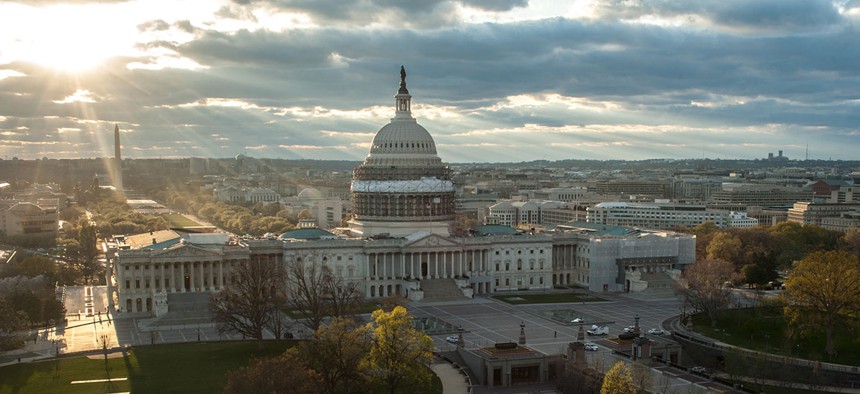
Architect of the Capitol
This is What Happens if the House Picks the Next President
If no candidate gets 270 electoral votes, the House gets to choose a winner. It’s happened before.
It’s Jan. 20, 2017, and Hillary Clinton, for a moment envisioning herself standing on the Capitol’s West Front taking the oath of office, instead approaches a podium at her Brooklyn campaign headquarters to concede the presidential election.
Donald Trump, still fuming at his ouster from the Republican ticket at the GOP convention, sits just miles away in his Manhattan penthouse conferring with lawyers about whether and how he can bring his third-party candidacy to power.
Meanwhile in Houston, Sen. Ted Cruz watches Clinton’s speech on television, scribbling notes on a pad of paper that will eventually become his inauguration speech. Only hours ago, Speaker Paul Ryan announced from the House rostrum that, after weeks of voting, Cruz has been named president by a majority of the chamber’s state delegations.
Is this scenario far-fetched? Of course. But it is not unprecedented.
The Constitution grants the House power to name a president if no candidate wins a majority of the country’s electoral votes. The last time this happened was in 1824, when John Quincy Adams emerged from a crowded field to be named president by the House over Andrew Jackson, Henry Clay, and William H. Crawford.
It has also come close to happening since. The elections of 1992 and 1980 could have been thrown into chaos had third-party candidates Ross Perot and John Anderson, respectively, won a few states while candidates Bill Clinton and Ronald Reagan won fewer. In 1968, Richard Nixon won the presidency with only 301 electoral votes, but George Wallace nearly acted the spoiler by winning five Southern states.
Some experts and historians think there is an outside chance that this is the year history repeats itself.
“Sooner or later it will eventually happen. It’s been a long wait since 1824,” University of Virginia law professor J. Gordon Hylton said. “The most likely thing is that someone—Donald Trump, Bernie Sanders, Mike Bloomberg—someone would have to announce a third-party candidacy and get on the ballots in at least some states and carry at least one state.”
Trump has indeed flirted with the idea of running as an independent if he is denied the GOP nomination. If he goes into the Republican National Convention leading in delegates, but Cruz or someone else emerges as the party nominee, Trump could be motivated to act on his threat.
Conversely, the election could plunge into chaos if Trump wins the nomination, but is faced with a case of unfaithful electors, or members of a state’s Electoral College who decide they cannot in good conscience vote for him.
Former House historian Ray Smock said there is no law to prevent electors from defecting from Trump, even if their state instructed them to vote for him—although being ostracized from their party may be motivation enough not to make waves.
“You do have some unusual circumstances going on, and probably the thing that could upset the apple cart in the Electoral College—which is always a possibility—is if the electors decide to not follow the instructions of their party or their state,” he said.
In the first scenario, it is not unthinkable that Trump as a third-party candidate could capitalize on his massive popularity in the South and the Rust Belt and emerge in a general election with a few states under his belt, so long as he could get on the ballot. In the second scenario, Trump as the GOP nominee could win many states, but a few could defect and vote for another Republican, perhaps Cruz. In either case, if Trump wins some states, but neither another Republican nor Democratic nominee win 270 electoral votes, the election would go to the newly elected House.
Although it seems unthinkable to most, it is clear that at least some members of the House are pondering the scenario. Rep. Mick Mulvaney, for instance, answered a Facebook questioner asking why he is not a delegate by writing that he wants to stay unaffiliated in case the House is asked to decide.
“I have already decided NOT to try to be a delegate. I want to stay sort of neutral just in case the election goes to the House of Representatives,” Mulvaney wrote. “I just want to be able—in the RARE event that the election goes to the House—to be able to be an honest broker.”
Unlike a normal roll call, the House vote would be a tally of the chamber’s state delegations, with each state representing one vote. That means California’s 53 representatives collectively have the same weight as Montana’s single congressman. Right now, Republicans hold a majority in 33 state delegations to the Democrats’ mere 14, with three tied. Since Republicans are almost universally favored to retain control of the chamber, the result of a House vote would most likely be a Republican president, even if the Democratic nominee won more electoral votes.
That happened in 1824, explained Oxford University fellow Donald Ratcliffe, author of a new book on that election titled The One-Party Presidential Contest. Jackson won a plurality, but not a majority, of the Electoral College. But after all was said and done, the House named Adams president.
Although that election predated political parties as we know them today, Ratcliffe said the election was so close because each candidate represented a clear constituency: Adams, the abolitionists; Jackson, the anti-British; Clay, the protectionists; and Crawford, much of the political establishment. He compared that to this year’s election, in which Trump, Cruz, Clinton, and Bernie Sanders seem to be appealing to very different segments of the population.
“Each of them is appealing to a constituency, and that constituency gets more clearly defined as the election process goes on,” he said. “Each of them is representing a different sort of bloc of opinion in the country, not always coherent blocs, but definable.”
Smock, however, said that for all the differences on the Democratic side, the party is much more stable than its counterparts. Barring an indictment or some other revelation that would make Clinton unpalatable, Sanders will probably endorse her if he loses the primary and vice versa. The same cannot be said for Republicans, who have been fighting a close and increasingly personal and bitter contest.
Still, he gave less than a 10 percent chance to the idea that the election would go to the House.
“It would be a complete mess and I hope that doesn’t happen, but it’s hard to predict now how the conventions are going to go,” he said. “We like to pretend our system works smoothly, and it usually does, until someone throws a monkey wrench into that system.”
NEXT STORY: Play of the Day: Superdelegates, Explained







